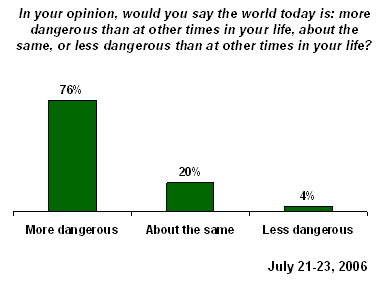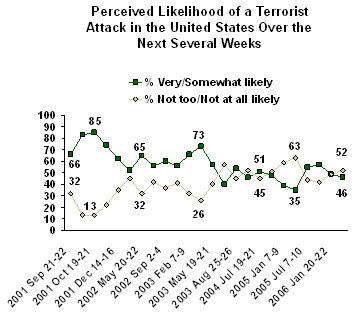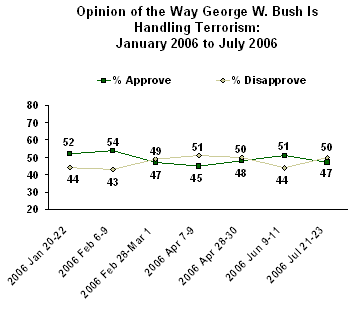GALLUP NEWS SERVICE
PRINCETON, NJ -- As violence in the Middle East, both in Iraq and between Israel and Hezbollah, continues to dominate the headlines this week, a recent USA Today/Gallup poll finds that most Americans believe the world today is more dangerous than at most other times in their lives. Despite the recent rise in violence overseas, Americans are no more likely to expect a terrorist attack against the United States than they were at the beginning of the year. President George W. Bush's approval rating on terrorism is down slightly from early June, but Bush still fares better on this issue than on others Gallup has tested.
The July 21-23 poll finds that 76% of Americans say the world today is more dangerous than at other times in their lives, while only 4% say it is less dangerous and 20% say it is about the same.

Although a majority of all Americans say the world is more dangerous today, some groups of Americans are more inclined to feel this way than others. Women, senior citizens, those residing in the East, and Democrats are among the groups who are most likely to say the world is more dangerous today.
|
World More/Less Dangerous Today |
|||
|
More |
About |
Less |
|
|
% |
% |
% |
|
|
|
|
|
|
|
Men |
67 |
27 |
5 |
|
Women |
83 |
13 |
3 |
|
|
|
|
|
|
18- to 29-year-olds |
66 |
27 |
7 |
|
30- to 49-year-olds |
75 |
21 |
4 |
|
50- to 64-year-olds |
77 |
20 |
2 |
|
65 years and older |
82 |
12 |
4 |
|
|
|
|
|
|
Easterners |
81 |
16 |
3 |
|
Midwesterners |
73 |
21 |
5 |
|
Southerners |
74 |
22 |
3 |
|
Westerners |
74 |
20 |
5 |
|
|
|
|
|
|
Republicans |
68 |
24 |
7 |
|
Independents |
72 |
24 |
4 |
|
Democrats |
86 |
12 |
1 |
Forty-six percent of Americans say it is at least somewhat likely that there will be a terrorist attack in the United States over the next several weeks, including 10% who say it is "very" likely. A slim majority of Americans say it is "not too" (42%) or "not at all" (10%) likely.
The perception that a terrorist attack would occur in the United States was higher in July of last year, when an average of 56% of Americans said an attack was likely to occur. This came after terrorists bombed the London mass transit system early that month. This sentiment then decreased by January of this year, with roughly the same percentage as in the latest poll saying an attack was likely. Views that a terrorist attack is likely to occur have fluctuated significantly since Gallup first asked this question, from a high of 85% in October 2001, a month after the 9/11 attacks, to a low of 35% in June 2005.

The latest survey finds that women are more likely than men, and older Americans more likely than younger Americans, to believe an attack will occur in the United States over the next several weeks. There are essentially no differences between Republicans and Democrats on this matter.
|
Likelihood of a Terrorist Attack in the United States |
||
|
Very/ |
Not too/ |
|
|
% |
% |
|
|
|
|
|
|
Men |
39 |
59 |
|
Women |
51 |
46 |
|
|
|
|
|
18- to 29-year-olds |
40 |
56 |
|
30- to 49-year-olds |
43 |
54 |
|
50- to 64-year-olds |
49 |
50 |
|
65 years and older |
52 |
45 |
|
|
|
|
|
Republicans |
46 |
53 |
|
Independents |
43 |
55 |
|
Democrats |
48 |
48 |
Americans' Ratings of President Bush's Handling of Terrorism
Americans are currently more negative than positive in their assessments of Bush's handling of terrorism, with 47% approving and 50% disapproving. Bush's approval rating on this issue is down slightly from 51% in early June. Bush continues to be rated more positively for his handling of terrorism than he is on all other issues Gallup tracks.
Over the course of the year, Bush's ratings on handling terrorism have fluctuated between a high of 54% in February and a low of 45% in early April. Over the course of Bush's entire administration, his high point on handling terrorism was 86% following the 9/11 attacks and his low was the recent 45% reading.

Survey Methods
The latest results are based on telephone interviews with a randomly selected national sample of 1,005 adults, aged 18 and older, conducted July 21-23, 2006. For results based on this sample, one can say with 95% confidence that the maximum error attributable to sampling and other random effects is ±3 percentage points. In addition to sampling error, question wording and practical difficulties in conducting surveys can introduce error or bias into the findings of public opinion polls.